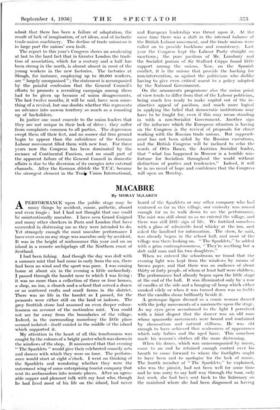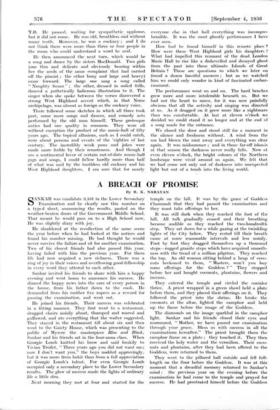MACABRE
By MORAY McLAREN
APERFORMANCE upon the public stage may be many things by accident, comic, pathetic, absurd and even tragic ; but I had not thought that one could be unintentionally macabre. I have seen Grand Guignol and many other shockers in Paris and London that have succeeded in distressing me as they were intended to do. Yet strangely enough the most macabre performance I have ever seen on any stage was macabre only by accident. It was in the height of midsummer this year and on an island in a remote archipelago off the Northern coast of Scotland.
I had been fishing. And though the day was dull with a summer mist that had come in early from the sea, there had been no wind and the sport was poor. I was coming home at about six in the evening a little melancholy. I passed through the hamlet near to which I was living : it was no more than a collection of three or four houses, a shop, an inn, a church and a school that served a dozen or so scattered crofts and small farms in the district. There was no life in the hamlet as I passed, for the peasants were either still on the land or indoors. The grey Scottish stone had assumed an even deeper colour- lessness on account of the motionless mist. You could not see far away from the boundaries of the village. Indeed, in the surrounding monotony the little place seemed isolated—itself enisled in the middle of the island which supported it.
My attention in the heart of all this tonelessness was caught by the colours of a bright poster which was shown in the windows of the shop. It announced that that evening " The Sparklets " would give their celebrated comedy acts and dances with which they were on tour. The perform- ance would start at eight o'clock. I went on thinking of the Sparklets and wondering whether they were the outermost wing of some enterprising tourist company that sent its ambassadors into remote places. After an agree- able supper and pleasant talk with my host who, though he had lived most of his life on the island, had never heard of the Sparklets or any other company who had ventured so far as this village, our curiosity was roused enough for us to walk down to see the performance. The mist was still about us as we entered the village, and there was still little sign of life. We fortified ourselves with a glass of admirable local whisky at the inn, and asked the landlord for information. The show, he said, was already begun in the school hall, and most of the village was there looking on. " The Sparklets," he added with a grim contemptuousness, " They're nacthing but a daft auld man and his two daughters."
When we entered the schoolroom we found that the evening light was kept from the windoWs by means of brown paper, and that there was an audience of about thirty or forty people, of whom at least half were children. The performance had already begun upon the little stage at the end of the hall. It was illuminated only by a row of candles at the side and a hanging oil lamp which either smoked vilely or when it was turned down was so feeble that the candles shone brilliantly beside it.
A grotesque figure dressed as a comic woman danced with the jerky movements of a marionette upon the stage. As my eyes grew accustomed to the light I perceived with a faint disgust that the dancer was an old man whose spasmodic movements were bound and contained by rheumatism and natural stiffness. He was old enough to have achieved that sexlessness of appearance which only babies and the aged have. This somehow made his woman's clothes all the more distressing.
When his dance, which was unaccompanied by music, came to an end he retained enough control over his breath to come forward to where the footlights ought to have been and to apologise for the lack of music. The fourth member of " The Sparklets," he explained, who was the pianist, had not been well for some time and he was sorry to say half way through the tour, only last week, she had been sent back to the Infirmary on the mainland where she had been diagnosed as having T.B. He paused, waiting for. sympathetic. applause, but it did, no come. He was old, breathless and without many teeth. Moreover, he was a cockney ; and I do not think there were more than three or four people in the room who could understand a word he said.
He then announced the next turn, which would be a song and dance by the sisters MacDonald. Two girls (one thin and delicate and obviously bearing within her the seeds of the same complaint that had carried off the pianist ; the other bony and large and heavy) came forWard. The large one sang a song called " Naughty Susan " ; the other, dressed in soiled frills, danced a pathetically ludicrous illustration to it. The singer when she spoke between the verses discovered a strong West Highland accent which, in that Norse archipelago, was almost as foreign as the cockney voice.
There followed sonic sketches in which all three took part, some more songs and dances, and comedy acts performed by the old man himself. These grotesque antics had one quality in common. They were all without exception the product of the music-hall of fifty years ago. The topical allusions, such as I could catch, were about. persons and events of the 'eighties of last century. The incredibly weak puns and jokes were made more feeble by their remoteness. And though I am a sentimental lover of certain out-of-date music-hall gags and songs, I could folow hardly more than half of what was said by the toothless old cockney and his -West Highland daughters. I am sure that for nearly everyone else in that hall everything was incompre- hensible. It was the most ghostly performance I have ever seen.
How had he found himself in this remote place ? How were these West Highland girls his daughters ? What had impelled this remnant of the dead London Music Hall to rise like a dishevelled and decayed ghost from the past into these ultimate Islands of Great Britain ? These are questions to which we later on found a dozen fanciful answers ; but as we watched him we could only wonder in kind of fascinated embar- rassment.
The performance went on and on. The hard benches grew more and more intolerable beneath us. But we had not the heart to move, for it was now painfully obvious that all the activity and singing was directed at us. As it dragged on it grew more like a nightmare than was comfortable. At last at eleven o'clock we decided we could stand it no longer and at the end of a song made for the entrance.
We closed the door and stood still- for a moment in the silence and freshness without. A wind from the sea had blown the mist away and everything was clear again. It was midsummer ; and in those far-off islands at that season the darkness never really falls. Now at even eleven o'clock, the bright colours of the Northern landscape were vivid around us again. We felt that we had come not only out of darkness into unexpected light but out of a tomb into the living world.







































 Previous page
Previous page